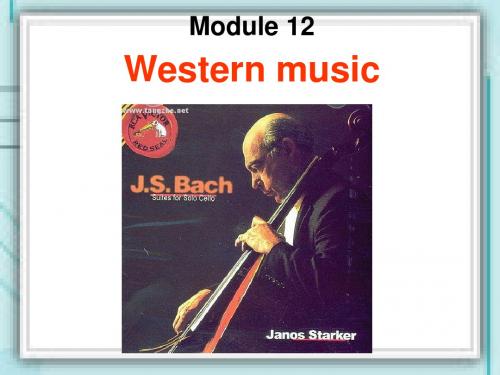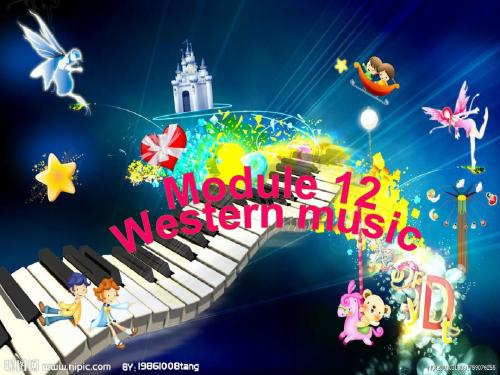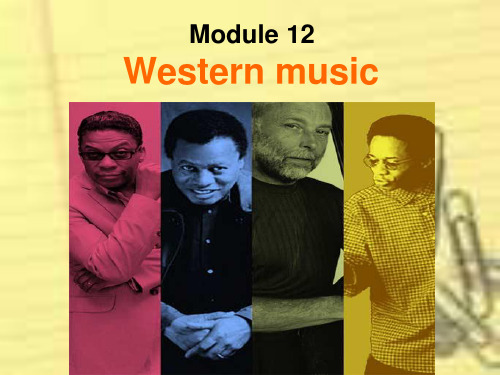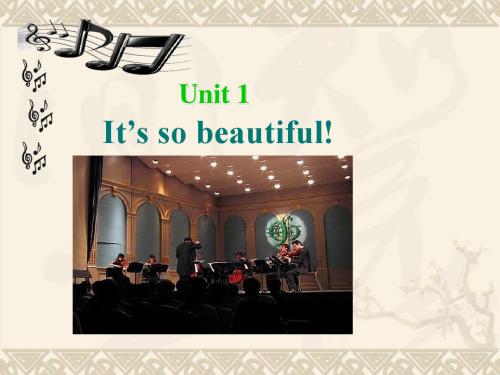2018新外研版七年级英语下M12-U1
英语七年级下外研版M12U1优质教案

英语七年级下外研版M12U1优质教案一、教学内容本节课选自英语七年级下外研版Module 12 Unit 1 It's a pleasure. 教学内容主要涉及第1章,详细内容为:学习日常交际用语,如何表达喜好、兴趣以及礼貌回答他人对自己的赞美。
二、教学目标1. 能够听懂、会说、会读、会写与喜好、兴趣相关的词汇和句型。
2. 能够运用所学知识进行日常交流,表达自己的喜好和对他人的赞美。
3. 培养学生的跨文化交际意识,使他们能够在实际情景中灵活运用所学知识。
三、教学难点与重点1. 教学难点:如何正确使用形容词和动词表达喜好、兴趣,以及礼貌回答他人赞美。
2. 教学重点:词汇和句型的掌握,如:favourite, like, love, enjoy, pleasure, hobbies等。
四、教具与学具准备1. 教具:多媒体设备、黑板、教学挂图。
2. 学具:课本、练习册、词汇卡片。
五、教学过程2. 新课展示:学习词汇和句型,进行互动问答,让学生在实际语境中运用所学知识。
3. 例题讲解:讲解如何用英语表达喜好、兴趣,以及礼貌回答他人赞美,结合实例进行讲解。
4. 随堂练习:让学生进行角色扮演,模拟真实场景,练习所学知识。
六、板书设计1. 词汇:favourite, like, love, enjoy, pleasure, hobbies 等。
2. 句型:What's your favourite ? I like/love/enjoy It'sa pleasure.七、作业设计1. 作业题目:a. 根据所给词汇和句型,编写一段对话,表达自己的兴趣爱好。
b. 回答问题:What's your favouritesport/subject/colour? Why?2. 答案:八、课后反思及拓展延伸1. 课后反思:关注学生的学习效果,了解他们在学习过程中的困惑,及时调整教学方法。
2. 拓展延伸:鼓励学生课后收集关于兴趣爱好方面的英语表达,进行课堂分享,提高学生的跨文化交际能力。
2018新外研版七年级英语下M12-U2

8.其中两个最重要的作曲家
9.不但……而且……
10.带领某人参观 11.举办音乐会 12.在……岁时 13.几百首优美的乐曲 14.最著名的欧洲作曲家
two of the most important composers not only…but also take sb around give concerts at the age of hundreds of beautiful pieces of music the greatest European composer
Module 12
Western music
Unit 2
Vienna is the centre of European classical music.
Some instruments (乐器)
violoncello piano organ saxophone drum violin trumpet guitar 大提琴 钢琴 管风琴 萨克斯 鼓 小提琴 喇叭;小号 吉他
Read and check ( √ ) the true sentences.
1. Many musicians came to study and √ work in Vienna. 2. Strauss the younger played the piano, the violin and thedrums at the age of six. × √ 3. Mozart’s family took him around Europe. 4. The father, Johann Strauss, died in 1791.
如果not only…but also…连接的是主语,谓 语动词应该遵循就近原则。如:
新外研版七年级下M12Unit 1

6.我简直无法相信那是真的! don’t believe it is true ! I _____________ 7.流行乐听起来活泼.
______ Pop music _______________. sounds lively 8. 这是由斯特劳斯还是莫扎特创作的? _____ ____ Is this ______Strauss by or Mozart? 9 两个学生都认为摇滚乐太吵了。 too Both students _____________think rock music is much ______ noisy 10 长城跨过高山,横过沙漠,穿越峡谷。 The Great Wall goes over _____ mountains,across ____ the deserts, _______ through the valleys.
Johann Strauss /’jəʊha:n/ /straus/
(约翰.施特劳斯)/ 1 Was he German? 2 Where was he born? 1 No, he wasn’t. /vi’enə/ 2 He was born in Vienna(维也纳), the capital of Austria(奥地利). /’ɔstriə/
Beijing opera is very different.
D: This is Western music, isn’t it? Can you hear the
vioin and the piano? It’s so beautiful! Is this by Stauss or Mozart, Tony? 1)_____________________ I’m not sure. L : 2)_____________________. B: It’s by Stauss. I love the music! Do you know anything about him? Was he German T: 3)___________________? B: N0, he was born in Vinena, the capital of Austria. What a beautiful city 5______________ This is calledThe blue 4________________. Danube. The Danue is a river in Europe. It goes through Vinena 6)____________________.
外研版七年级英语下M12 Unit 1课件

We walk through the forest. 我们穿过森林。
③ over 多指空间范围上通过, 越过或垂直在上,和表面不 接触等。
The birds fly over the city. 鸟儿飞过城市。
Phrases: the capital of, go through, Beijing opera, a fan of Patterns:
—Is this by Strauss or Mozart? —It’s by Strauss.
What a beautiful city! I’m a fan of rock music.
4. Betty likes _b_o_t_h__ traditional Western music and pop music.
5. Tony thinks the sound of the __v_o_i_c_e__ in Beijing opera is very different.
6 Complete the sentences about yourself.
Give us a break!
Look and Say
Try to point out the type of music for each picture.
Classical music
Pop music
Rock
Opera
Jazz
Blues
New age
1 Listen and number the words as you hear them.
英语七年级下外研版M12U1教案

英语七年级下外研版M12U1教案一、教学内容本节课选自英语七年级下外研版Module 12 Unit 1 It's a pleasure to meet you. 教学内容主要涉及第1课,详细内容包括:新词汇学习(如:pleasure, wonderful, subject, grade等),重点句型(如:It's a pleasure to meet you. What subjects do you have? I have),以及如何用英语进行自我介绍和询问他人的基本信息。
二、教学目标1. 学生能够掌握本节课的新词汇和重点句型,并能熟练运用到实际情景中。
2. 学生能够用英语进行自我介绍,并询问他人的基本信息。
3. 学生能够在小组活动中,培养合作意识,提高口语表达能力。
三、教学难点与重点教学难点:新词汇的掌握和运用,以及自我介绍和询问他人信息的表达方式。
教学重点:It's a pleasure to meet you. What subjects do you have? I have等句型的运用。
四、教具与学具准备教具:黑板、粉笔、多媒体设备、教学课件。
学具:英语课本、练习本、彩色笔。
五、教学过程1. 导入:通过展示不同国家的问候方式,引导学生用英语进行问候,从而引入本节课的主题。
2. 新课内容展示:教师讲解新词汇和重点句型,学生跟随教师朗读并模仿。
3. 实践情景引入:教师创设一个新同学加入的情景,让学生用所学知识进行自我介绍和相互问候。
4. 例题讲解:教师给出一个自我介绍的例题,分析并讲解如何运用所学知识进行表达。
5. 随堂练习:学生分成小组,用所学知识进行自我介绍和询问组员的基本信息,然后进行汇报。
六、板书设计1. Module 12 Unit 1 It's a pleasure to meet you.2. 新词汇:pleasure, wonderful, subject, grade等。
新外研社七年级下M12-U1_It‘s_so_beautiful.

Listen and read. (Blue Danube)
Daming: Hmm, this is Western music, isn’t it? Can you hear the violin and the piano? It’s so beautiful! Is this by Strauss or Mozart? Lingling: I’m not sure... Betty: It's by Strauss. I love his music! Do you know anything about him, Tony? Tony: Was he German? Betty: No, he was born in Vienna, the capital of Austria. What a beautiful city! This is called The Blue Danube. The Danube is a river in
2.Why doesn’t Tony like traditional Western music?
A.It’s too slow. B. It’s too noisy. C. It’s too fast.
3.Which music does Tony’s dad think is too noisy?
1 Listen and number the words as you hear them.
lively ( 7 ) noisy ( 9 ) sound ( 3 )
modern ( 5 ) pop ( 8 ) violin ( 4 )
music ( 1 ) rock ( 6 ) Western ( 2 )
4. traditional Beijing Opera 传统的京剧 e.g. 你听说过传统的京剧吗? Have you heard of traditional Beijing Opera? 5. a fan of… ……迷/爱好者 e.g. A. 他妈妈是个古典音乐爱好者。 His mother is a fan of classical music. B. 我的同桌是个足球迷。 My deskmate is a fan of football.
外研版七年级英语下册m12 Unit 1 It’s so beautiful课件 (共31张PPT)
the Blue Danube
蓝色多瑙 河
classical music by Strauss
4 Listen and check the types of music the students like.
the kinds of music
Tony Lingling Betty
traditional Western music
[ˋlaɪvli] adj. [ˋ mɔdən] adj. [ˋ nɔɪzi] adj. [pɔp] adj. [rɔk] n. [saʊnd] n. [.vaɪə ˋ lɪn] n. [ˋ westən ] adj. [θru:] prep.
lively 活泼的;轻快的 modern现代的 noisy 吵闹的 pop 流行的,受欢迎的 rock 摇滚乐 sound 声音 violin小提琴 western西方的 through 穿过
A: ….
Nothing is worth living for without music. Nietzsche
没有音乐,生命是没有价值的。 -- 尼采
Without the music education in my childhood, I would succeed in nothing. Albert Einstein
没有早期音乐教育,干什么事我都会一事无成。—— 爱因斯坦
Homework
Level A: Listen to the tape and read the dialogue three
times.
Level B: make a survey, write the report and read it to
Practice like this: A. What music do you like? Why? B. I like…..\I am a fan of ….It’s ….. but I
英语七年级下外研版M12U1教案
英语七年级下外研版M12U1教案一、教学内容1. Section 1: 主要介绍日常上学的时间表达,如 "It's seven o'clock. It's time to get up." 等。
2. Section 2: 通过对话形式,让学生学会如何用英语描述早晨起床、吃早餐、上学等日常活动。
二、教学目标1. 让学生掌握日常上学相关的时间表达和词汇。
2. 培养学生运用英语描述早晨日常活动的能力。
3. 提高学生的听说读写综合运用能力。
三、教学难点与重点1. 教学难点:描述早晨日常活动的句子结构和词汇用法。
2. 教学重点:时间表达和日常活动词汇。
四、教具与学具准备1. 教具:录音机、磁带、PPT、黑板、时钟模型。
2. 学具:英语课本、练习本、彩色笔。
五、教学过程1. 导入:通过播放早晨起床、吃早餐、上学的场景视频,引出本节课的话题。
2. 新课展示:(1)播放录音,让学生听并跟读Section 1的句子。
(2)教师讲解时间表达和词汇,板书重要句子。
(3)学生模仿例句,进行小组活动,描述早晨日常活动。
3. 例题讲解:讲解Section 2的对话,引导学生注意句子结构和词汇用法。
4. 随堂练习:让学生根据Section 2的对话内容,完成练习题。
六、板书设计1. 时间表达:It's seven o'clock. / It's time to get up.2. 日常活动词汇:get up, have breakfast, go to school, etc.3. 重要句子:What time is it? / It's time to七、作业设计1. 作业题目:(1)抄写本节课所学的时间表达和日常活动词汇,每个写5遍。
(2)根据Section 2的对话内容,编写一个新的对话,描述你的早晨日常活动。
2. 答案:见附件。
八、课后反思及拓展延伸1. 课后反思:教师应关注学生对时间表达和日常活动词汇的掌握情况,针对学生的薄弱环节进行巩固。
外研版七年级英语下册(教学课件)M12U1
Lingling: Rock music? Listen to those drums!
Darning: It’s so noisy! And much too fast! Tony: You don’t like rock music? I don’t believe it!
1. Strauss wasn’t _G_e_r_m__a_n__. He came from Austria.
2. Daming thinks the _d_r_u_m__s _ in rock music are too _n__o_is_y___.
3. Tony can’t __b_e_li_e_v_e__ that Daming doesn’t like rock music.
Pop music
Pop Music 贾斯丁《Baby one more time》
Opera
Jazz
Blues
New age
Review
Read the words and expressions loudly.
new words
lively modern
noisy pop rock
— What music do you like? — I like pop. It’s lively and good to dance
to, but I don’t like rock. It’s too noisy. What about you?
Dialogue Practice
A: What music do you like? B: I like classical music. It’s beautiful.
2018春七年级英语下册 Module 1 Unit 2 教学课件1 (新版)外研版
e.g.: two hundred students 两百个学生
hundreds of teachers 好多老师
K12课件
12
中考链接
• Some scientists(科学家) think that it will take
of years to make robots(机器人) do most work for humans(人类).
• 2、find意为“找到;发现”,强调“找”的结果, 其宾语往往是某个丢失的东西或人。
• I’m looking for my bag, but I can’t find it.
• 我找我的书包,但我没K1找2课件到。
14
• At the moment, there are also some strange things at the New York City Lost and Found Office. There are bout a hundred bikes and a large boat. There are also a lot of animals.This week, there are three dogs, two ducks and a pig! Whose are they? Are they yours? Wedon’t kno
K12课件
11
• hundreds of 意为“数百”,类似的短语还有 thousands of(数以千计的),millions of (数百 万的)。
• 注意:hundreds of表示的是一个概数,前面不能 再加基数词修饰。当hundred之前有一个确切的基 数词修饰的时候, 它要使用单数形式。
K12课件
- 1、下载文档前请自行甄别文档内容的完整性,平台不提供额外的编辑、内容补充、找答案等附加服务。
- 2、"仅部分预览"的文档,不可在线预览部分如存在完整性等问题,可反馈申请退款(可完整预览的文档不适用该条件!)。
- 3、如文档侵犯您的权益,请联系客服反馈,我们会尽快为您处理(人工客服工作时间:9:00-18:30)。
➢ To understand the dialogue on Page 72
➢ To learn the key words and useful expressions in the dialogue
Words: lively, modern, nosy, traditional, pop, rock, sound, violin, opera
_d_o_e_s_s_h_e__? 6. You didn’t call me yesterday,
_d_i_d_y_o_u_____?
3. 在回答反义疑问句时,不管问题的提 法如何,若事实是肯定的,就要用yes, 事实是否定的,就要用no。这和汉语不 一样,应特别注意。例如:
You’re not ready, are you? 你没有准备好,是吧? Yes, I am. 不,我准备好了。 No, I’m not. 是的,我没有。
too noisy?
Listen again and check.
3 Listen and read the dialogue on Page 72.
Language points
Western music, isn’t it? 西方音乐,不是吗? You listen to pop music, Lingling, don’t you? 你听流行音乐,是吧,玲玲? The sound is very … different, isn’t it? 这种音乐很不同,不是吗?
1. It often rains here, _d_o_e_s_n_’_t _it_? 2. He likes soccer, _d_o_e_s_n_’_t _h_e?
3. You have a headache, _d_o_n_’_t_y_o_u_? 4. I called you yesterday, _d_i_d_n_’_t _I?
Phrases: the capital of, go through, Beijing opera, a fan of Patterns:
—Is this by Strauss or Mozart?
—It’s by Strauss.
What a beautiful city!
I’m a fan of rock music.
sound n. 声音 violin n. 小提琴 Western adj. 西方的
Words
hmm int. 嗯 by prep. 由……创作;被;由
through prep. 穿过 both pron. 两个;两者 voice n. 声音 drum n. 鼓
believe v. 相信
Objectives:
狮子很恐怖,不是吗? 结构二: 前否 + 后肯 eg. Lions aren’t scary, are they?
狮子不恐怖,对吧?
结构一: 前肯 + 后否 Be 动词:
1. You are an actor, _a_r_e_n_’_t _y_o_u_? 2. He is a good boy, _i_s_n_’t__h_e_? 3. It was fine yesterday, _w_a_s_n_’_t_i_t _? 行为动词:
lively ( 7 ) noisy ( 9 ) sound ( 3 )
modern ( 5) pop ( 8 )
violin ( 4 )
music ( 1 ) rock ( 6 ) Western ( 2 )
2 Work in pairs. Answer the questions about the conversation in Activity 1.
1. Which modern music does Tony like? 2. What does Tony’s mum think about
rock music? 3. Why doesn’t Tony like traditional
Western music? 4. Which music does Tony’s dad think is
结构二: 前否 + 后肯 1. You aren’t an actor, __a_r_e__y_o_u_? 2. He isn’t a good boy, ___is_h__e__? 3. It wasn’t fine yesterday, __w__a_s_it__? 4. It doesn’t rain here, __d_o_e_s_i_t___? 5. His sister doesn’t have a headache,
Give us a break!
Look and Say
Try to point out the type of music for each picture.
Classical music
Pop music
Rock
Opera
Jazz
Blues
New age
1 Listen and number the words as you hear them.
Module 12
Western music
Unit 1
It’s so beautiful!
Review
Words and expressions
Words
lively adj. 活泼的,轻快地 modern adj. 现代的
noisy adj. 吵摇滚乐;石头;岩石
以上这些句子中都包含一个反义疑问句。
反意疑问句 1. 含义 在一个陈述句之后附上一个简短的疑 问句,对陈述句提出相反的疑问,这 种疑问句叫反意疑问句。 如:
1) Lions are scary, aren’t they? 2) We speak Chinese, don’t we?
2. 结构: 结构一: 前肯 + 后否 eg. Lions are scary, aren’t they?
